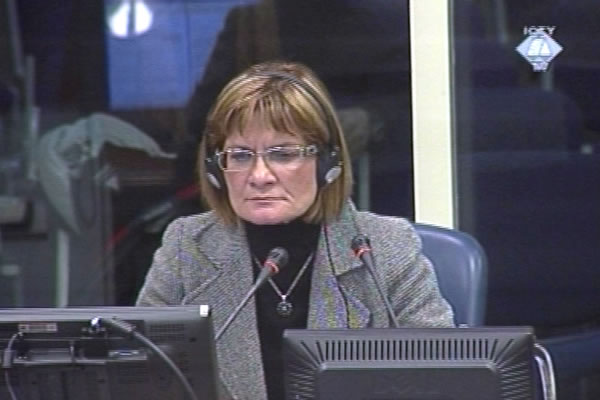Home
GOOD IDEA THAT SOMETIMES DIDN’T WORK
Markac’s defense witness contends that legislation was passed after Operation Storm to speed up the Serbs’ return to Krajina, but in some cases, the laws were not efficient enough. People had to wait for a long time for their houses to be restored to them – in some cases as long as six years
 Snježana Bagic, defence witness of Mladen Markac
Snježana Bagic, defence witness of Mladen Markac Prosecutor Katrina Gustaffson today cross-examined Snjezana Bagic, a judge of the Croatian Constitutional Court. Gustaffson put it to the witness that the Croatian authorities had taken measures to prevent the Serb refugees from returning to Krajina after Operation Storm, and wanted to settle Croats permanently in Serbian houses. According to the prosecution, a decree and a law on the temporary takeover of abandoned property were passed in August and September 1995 with that goal.
The witness was a secretary in the Justice Ministry at the time and she took part in the drafting the controversial laws. Bagic rejected the prosecutor’s allegations, saying that the goal was to speed up the Serbs’ return to their homes. The law first set a 30-day deadline for the refugees to return and reclaim their property: it was later extended to 90 days. The prosecutor noted that the deadline was too short and made Serbs decided not to come back, because the property could not be reclaimed after the expiry of the 90-day deadline. The law on the temporary takeover of property was not the only law enabling the Serbs to claim their property, Judge Bagic said; the Constitution and the law on property gave them that right in the first place.
Sticking to the claim that Croatia did everything to prevent the Serbs from coming back, the prosecutor asked the witness if she knew of a single case where a Serb was able to return to Croatia and reclaimed their property between early 1996, when the 90-day period expired, and 1998, when the refugee issue was regulated by an agreement between Croatia and FR Yugoslavia. Snjezana Bagic’s ministry was not in charge of monitoring the return of the refugees, she said, and she could therefore not give any examples of successful return of property in that period.
When the prosecutor put it to her that in some cases the refugees were able to reclaim their houses after as long as six years, the witness said the system was meant to speed up their return as much as possible, but in some cases it was less than efficient. This is why, she explained, the legislation was amended whenever it proved to be ineffective.
Yesterday, Bagic claimed that the option of confiscating abandoned Serb property was never considered. Today, the prosecutor today showed her the minutes from a closed session of the Croatian government of 31 August 1995, where the prime minister and members of his cabinet say that the confiscation as an option should be deleted from the decree because this might lead to pressure from the West where private property is sacred. The witness then allowed it was possible that the confiscation was mentioned ‘as an alternative’ in the draft of the decree. She herself took part in the drafting.
Snjezana Bagic thus completed her evidence for Mladen Markac’s defense. Markac is on trial together with generals Gotovina and Cermak for his role in the joint criminal enterprise aimed at expelling of Serbs from Krajina in the summer of 1995. General Repinac, Markac’s expert witness, is scheduled to begin his evidence tomorrow.
Linked Reports
- Case : Gotovina et al. - "Operation Storm"
- 2010-01-11 ‘REVOLUTIONARY JUSTICE’ OR PROTECTION OF SERB PROPERTY?
- 2009-12-18 CROATIA MAY CONTINUE ITS SEARCH FOR ARTILLERY DOCUMENTS
- 2009-12-18 WITNESS: ‘ARMY TROOPS, NOT POLICE, BURNED HOUSES’
- 2010-01-13 DEFENSE EXPERT: ‘SPECIAL UNITS DIDN’T CONTROL TERRITORY’
- 2010-01-14 FEW INCIDENTS IN LARGE-SCALE SEARCH
- 2010-01-18 NEW OR FABRICATED FACTS ABOUT GRUBORI?
